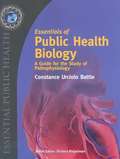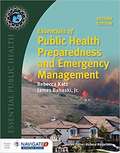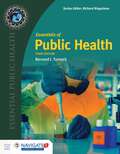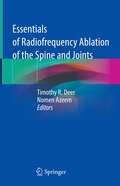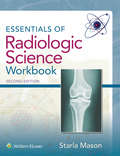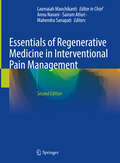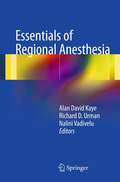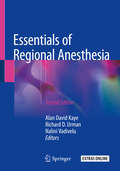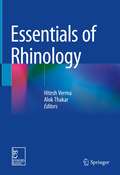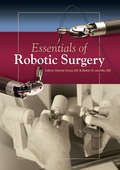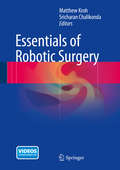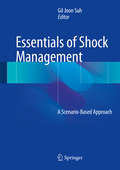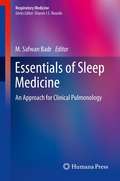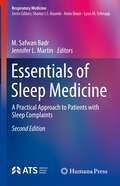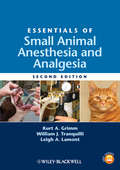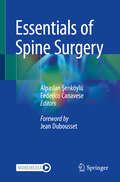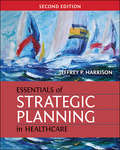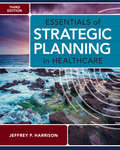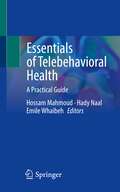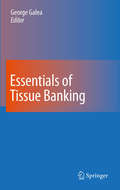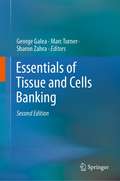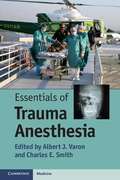- Table View
- List View
Essentials of Public Health Biology: A Guide for the Study of Pathophysiology
by Constance U. BattleUnderstanding how and why manifestations of a disease occur and incorporating this knowledge into public health decision-making is the very essence of public health practice. As the only text of its kind, Essentials of Public Health Biology explores pathophysiology within the context of the disciplines and profession of public health. Readers will gain a clear understanding of the pathogenesis of various disease conditions and how to identify critical points at which such pathogenesis could either be prevented or interrupted. Infectious, nutritional, metabolic, genetic, and environmental risks and the impact of such risks on various organ systems are thoroughly examined. Ideal for the student with a science background, this text applies the scientific clinical foundation to the practice of public health through case studies, exercises, and points for discussion. Features:* Gives readers a clear understanding of the biological basis of disease put in the context of Public Health. * Teaches key skills in public health to prepare the student for further investigation of critical topics. * Includes a complete package of instructor and student resources including interactive flashcards and glossary available at www. jbpub. com/essentialpublichealth/battle.
Essentials of Public Health Preparedness and Emergency Management
by Rebecca Katz Jim BanaskiThe public health community plays a vital role in identifying, responding to, containing, and recovering from emergencies. Essentials of Public Health Preparedness and Emergency Management takes an all hazards approach to public health preparedness and emergency management by providing broad perspectives on local, national, and global threats. <p><p> The Second Edition adds authoritative coverage of the field of Emergency Management with the addition of a new co-author, James Banaski, Jr., a hands-on emergency management professional. The Second Edition also includes case studies on Ebola and Zika which demonstrate approaches to addressing the threat of emerging infectious diseases. Additional case studies focus on bioterrorism, environmental disasters, and the need for a coordinated approach involving the full range of first responders, public health and clinical health professionals, and a range of other emergency response professionals. <p><p> Key Features: - Assumes no previous exposure to the concepts making it readable for those who are new to Public Health, yet provides enough depth for readers who may have advanced knowledge. - Offers new chapters on The Preparedness Cycle, Practical Applications of Public Health Emergency Management, and Developing a Public Health Emergency Operations Center - Supports mastery of the Public Health Preparedness and Response competencies developed by the Association of School and Programs of Public Health - Includes Navigate 2 Advantage Access that unlocks a complete eBook, Study Center, homework and Assessment Center, and a dashboard that reports actionable data. Experience Navigate 2 today at www.jblnavigate.com/2.
Essentials of Radiofrequency Ablation of the Spine and Joints
by Timothy R. Deer Nomen AzeemThis book provides a comprehensive review of the development of radiofrequency ablation (RFA) for the treatment of chronic pain. The book consists of three sections; it begins with the foundations of RFA by examining its history, development, mechanisms of action, and types. The second section explores various indications for RFA, including cervical pain, spinal metastasis, vertebral body, and hip joint pain. The final section then discusses the utilization of peripheral nerve ablation. The book concludes with future indications and forward-looking options for these therapies. Essentials of Radiofrequency Ablation of the Spine and Joints is a forward-looking resource that recognizes the expanding field of RFA indications and new tools for ablation.
Essentials of Radiologic Science Workbook
by Starla MasonEssentials of Radiologic Science Workbook, Second Edition, is designed to accompany Essentials of Radiologic Science, Second Edition and provides students with additional practice applying difficult theories. This Workbook also serves as preparation for The American Registry of Radiologic Technologists Examination in Radiography and includes Registry-style review questions, as well as other exercises to appeal to different learning styles. Features of the Workbook: Registry-style multiple choice review questions assess knowledge and provide preparation for the registry examination Image labeling exercises enhance learning with visual reinforcement of material Crossword puzzles offer an enjoyable way for students to review relevant terms and concepts Laboratory Experiments provide students with opportunities to directly apply their learning with hands-on activities
Essentials of Regenerative Medicine in Interventional Pain Management
by Laxmaiah ManchikantiRegenerative medicine is an emerging and integral part of interventional pain management and meets definitions of interventional pain management and interventional techniques. Interventional techniques are defined as minimally invasive procedures including, percutaneous precision needle placement, with placement of drugs in targeted areas or ablation of targeted nerves; and some surgical techniques such as laser or endoscopic diskectomy, intrathecal infusion pumps, and spinal cord stimulators, for the diagnosis and management of chronic, persistent, or intractable pain. On the same token, interventional pain management is defined as the discipline of medicine devoted to the diagnosis and treatment of pain related disorders principally with the application of interventional techniques in managing subacute, chronic, persistent, and intractable pain, independently or in conjunction with other modalities of treatment.This new edition brings a wide array of information for interventional pain physicians and other physicians practicing regenerative medicine with its applications in managing chronic pain and other disorders. The structure of the book begins with an introduction of the subject, followed by sections on historical context, pathophysiology, applicability of regenerative medicine with its evidence base, anatomy, technical aspects, complications, and precautions for each topic when available and applicable. From across the globe, leading experts in their respective fields contributed chapters on specific topics to present a cogent and integrative understanding of the field of regenerative medicine as applicable for interventional pain physicians. This comprehensive text achieves its goal of providing an evidence-based approach to application of principles of regenerative medicine in managing chronic pain of spinal, neurological, and musculoskeletal origins.
Essentials of Regional Anesthesia
by Alan D. Kaye Richard D. Urman Nalini VadiveluThis is a compact, single-source guide to regional anesthesia. Chapters are authored by regional anesthesia fellowship directors and fellows to insure maximum practicality and up-to-date coverage. Essentials of Regional Anesthesia covers all anatomical regions as well as the unique considerations in patients with chronic pain, obstetric patients, pediatric patients, and patients treated in the outpatient setting. A common chapter format makes it easy to find information quickly, and extensive illustrations enhance the text. Stay current with Essentials of Regional Anesthesia, and stay ahead with these helpful features: * Ultrasound incorporated into each block * Extremely practical focus * More than 400 Q & As to test knowledge * Authored by regional anesthesia fellowship directors and fellows * Clinical pearls and guidance on complications * Concise, clinically oriented review of relevant basic science * Common chapter format for ease of use * Well illustrated with 350 figures, nearly 200 in color
Essentials of Regional Anesthesia
by Richard D. Urman Nalini Vadivelu Alan David KayeThe management of pain can often be achieved by medications, physical therapies, or by various procedural techniques that have evolved in recent decades. With the trend towards more outpatient surgeries and less invasive surgeries to decrease perioperative risk, perioperative time, and costs, the practice of anesthesia is evolving to utilize regional anesthesia techniques both for inpatients and outpatients. Regional anesthesia is being performed for outpatient surgeries, obstetric anesthesia, trauma, chronic pain states, and for acute post-operative pain management. Therefore, it is paramount for physicians and nurses practicing anesthesia to understand the essentials of regional anesthesia, its evolving techniques, and appropriate utilization of modern equipment and technology to provide care safely. Essentials of Regional Anesthesia, Second edition, is a concise, up-to-date, evidence-based handbook that enables every resident, physician and nurse to understand the basics of regional anesthesia and the standard of care guidelines for the practice of regional anesthesia in a comprehensive fashion. This new edition includes: · Updated and new chapters on Ambulatory, Critical Care, and Obstetrics topics· Full color, clear, detailed, anatomic drawings · Clinically relevant, practical aspects of regional anesthesia· International contributing authors who are experts in their field· Latest ultrasound techniques and images Review of 1st edition: “There are many books available on regional anesthesia, and the trend is either to focus on illustrations, forgoing any discussion, or on text descriptions, making them bulky and hard to read. This book maintains that perfect balance between text and illustrations. It is truly a master companion book on regional anesthesia.” (Tariq M. Malik, Doody’s Book Reviews, April, 2012)
Essentials of Rhinology
by Alok Thakar Hitesh VermaThis book serves as a practical guide for the otorhinolaryngologists to better understand the diseases of the sinonasal region, diagnosis, and management. The detailed knowledge of the complex anatomy of the sinonasal region is the key to surgical success. The text aims to help budding and practicing rhinologists to get an essence abreast of the current scientific advancement by engaging rhinologists with excellent awareness and knowledge as contributors. The book expands its span afar the usual by including topics on complications of endoscopic surgeries, empty sinus syndrome, packing material, open transcranial approach, biofilm, instruments, cavity management, and improved quality of life, etc. The purpose of microbiology, interventional radiology, pathology and nuclear medicine in the diagnosis and management of sinonasal diseases is contributed by authors from allied specialties. This book will be a useful resource for medical students, postgraduates in ENT, practicing rhinologists and general physicians in treating sinonasal diseases.
Essentials of Robotic Surgery
by Stefan W. Leichtle Manak SoodThe field of robotic surgery is dynamic and fascinating. Surgical robots currently perform a wide range of procedures across a diverse group of specialties, and they have proven to exhibit a number of significant advantages over manual surgeries, including increased precision, less blood loss and pain, and shorter recovery times. In a rapidly changing world of technology, healthcare organizations may find it difficult to determine how to incorporate robotically-assisted surgical techniques into their systems..Essentials of Robotic Surgery provides comprehensive, detailed analysis of the current developments in robotically assisted surgery. Covered in the book are the most notable, current surgical applications, from coronary revascularization to prostate surgery, from the lungs and esophagus to the uterus, from sleep apnea to head and neck cancer..Edited by Drs. Manak Sood and Stefan W. Leichtle, this book details the history of robotic surgical technologies and techniques, while looking ahead to the possibilities contained within future applications. Essentials of Robotic Surgery is an ideal resource for healthcare professionals who are considering whether robotic surgeries may be right for their organization.
Essentials of Robotic Surgery
by Matthew Kroh Sricharan ChalikondaEssentials of Robotic Surgery is designed to present a comprehensive and state-of-the-art approach to robotic surgery within the broad confines of general surgery. Sections address preliminary issues faced by surgeons who may be initially undertaking robotics. These areas include training, basic techniques and setup, as well as general troubleshooting. Subsequent chapters focus on specific disease processes and the robotic applications for those procedures. Written by experts in the field, each of these sections addresses patient selection, preoperative considerations, technical conduct of the most common operations, and avoiding complications. A brief review of the existing literature addressing the particular topic follows in each section. The text concludes with chapters on other robotic platforms beyond the only current FDA approved device (Intuitive Surgical) as well as future directions, including single-site, enhanced imaging, 3-D modeling, and tele-proctoring, including to and distant site surgery. Extensive illustrations and links to video make this an interactive text that will be of great value to general surgeons and associated sub-specialists, trainees including residents and fellows, fully trained surgeons looking to start a robotic surgery practice, and experienced robotic surgeons looking to expand the types of procedures that they currently perform robotically.
Essentials of Shock Management: A Scenario-Based Approach
by Gil Joon SuhThis book is designed to offer the reader first-rate guidance on shock management in the real world. Comprehensive, evidence-based, and up-to-date instruction is provided on optimal care of patients with different types of shock – septic, hemorrhagic, cardiogenic, anaphylactic, and obstructive – at all stages from initial response through to ICU admission. As well as management, the coverage encompasses pathophysiology, clinical presentation, diagnosis, and emerging trends. A further key feature is the use of a scenario-based approach to present a series of cases based on real-life experiences. Here, a narrative style and Q&A form are employed to vividly convey scenarios that may be encountered in clinical practice and to elucidate decision making in complex circumstances. When readers experience difficulty in answering the questions, the earlier sections can be consulted to identify the correct response. This book will be of great value for all health care professionals. In particular, it will be very helpful for novice or inexperienced practitioners in emergency medicine, critical care medicine, and traumatology.
Essentials of Sleep Medicine
by M. Safwan BadrSleep disorders represent a major portion of the chief complaints seen by pulmonologists and other physicians. Sleep apnea and hypopnea syndrome for example, are common disorders with significant adverse health consequences. Sleep apnea is associated with increased cardiovascular mortality, impaired quality of life and increased motor vehicle accidents. In addition, sleep apnea often co-exists with other chronic conditions including obesity, the metabolic syndrome, and tobacco use disorder. Patients with sleep-related conditions often present with non-specific complaints that require a broad and detailed knowledge of the wide range of sleep disorders. In Essentials of Sleep Medicine: An Approach for Clinical Pulmonology, a concise, evidence-based review of sleep medicine for the pulmonologist is presented. Providing a focused, scientific basis for the effects of sleep on human physiology, especially cardiac and respiratory physiology, chapters also outline a differential diagnosis for common sleep complaints and an evidence-based approach to diagnosis and management. This includes a review of the current standards of practice and of emerging technology and unresolved issues awaiting further research. Each chapter includes a summary of current research and outlines future research directions and issues. In all, Essentials of Sleep Medicine: An Approach for Clinical Pulmonology provides a clear diagnostic and management program for all the different sleep disorders, with a major focus on respiratory disorders of sleep, and includes key points and summaries. Developed by an international group of renowned authors, Essentials of Sleep Medicine: An Approach for Clinical Pulmonology is an invaluable resource for pulmonologists, respiratory care practitioners, polysomnographic technologists, graduate students, clinical researchers, and other health professionals seeking an in-depth review of sleep medicine.
Essentials of Sleep Medicine: A Practical Approach to Patients with Sleep Complaints (Respiratory Medicine)
by M. Safwan Badr Jennifer L. MartinThis book provides an overview of sleep and sleep disorders for practicing clinicians. Sleep disorders represent a major portion of the chief complaints seen by pulmonologists and other clinicians. Patients with sleep-related conditions often present with non-specific complaints that require a broad and detailed knowledge of the wide range of sleep disorders and their consequences. This concise, evidence-based review of sleep medicine offers a guide to pulmonologists, primary care physicians, and all clinicians involved in caring for patients with sleep disorders. Providing a focused, scientific basis for the effects of sleep on human physiology, especially cardiac and respiratory physiology, chapters also outline a differential diagnosis for common sleep complaints and an evidence-based approach to diagnosis and management. This includes a review of the current standards of practice and of emerging technology and unresolved issues awaiting further research. In all, this book provides a clear diagnostic and management program for all the different sleep disorders and includes key points and summaries. This new edition expands the scope of the previous to include additional sleep disorders and the most affected populations. Six new chapters are added on health disparities in sleep medicine, models of care for patients with sleep disorders/care coordination, sleep disordered breathing in pediatric populations, sleep in hospitalized patients, sleep in pregnancy, and sleep in older patients. Essentials of Sleep Medicine is an invaluable resource for physicians, clinical psychologists, respiratory care practitioners, polysomnographic technologists, graduate students, clinical researchers, and other health professionals seeking an in-depth review of sleep medicine.
Essentials of Small Animal Anesthesia and Analgesia
by Kurt A. Grimm William J. Tranquilli Leigh A. LamontEssentials of Small Animal Anesthesia and Analgesia, Second Edition presents the fundamentals of managing small animal anesthesia patients in a clinically relevant, accessible manual. The bulk of the book is distilled from Lumb and Jones' Veterinary Anesthesia and Analgesia to provide authoritative information in a quick-reference format, with references to Lumb and Jones' throughout for easy access to further detail. Logically reorganized with an easy-to-use structure and an increased focus on pain management, this new edition features new chapters on equipment and managing specific conditions.The Second Edition has been updated to reflect current practices in anesthesia and analgesia, and a new companion website offers review questions and answers, video clips, and an image bank with additional figures not found in the printed book. Essentials of Small Animal Anesthesia and Analgesia, Second Edition provides veterinary care providers and students with key information on anesthetic and analgesic pharmacology, physiology, patient assessment, and clinical case management.
Essentials of Spine Surgery
by Alpaslan Şenköylü Federico CanaveseThis concise textbook covers the full spectrum of spine surgery-related topics in a comprehensive yet easy-to-follow, readily accessible format. Addressing trauma, deformity, degeneration, oncology and infections, both in pediatric and adult patients, it provides a broad overview of this complex surgical discipline.Subdivided into four parts, each chapter exhaustively addresses a clinical problem, ranging from signs and symptoms, physical examination through differential diagnoses and classification to treatment options, possible complications and follow-ups. In appendix the reader will find relevant classifications, indexes, questionnaires and quality of life assessments. Didactical videos complement the book illustrating essential basic spine surgery techniques in the daily practice. Written by an international panel of experts this practical and handy guide is an invaluable tool for trainees of both orthopedic surgery and neurosurgery, spine fellows, and junior spine surgeons.
Essentials of Strategic Planning in Healthcare, Second Edition (Gateway to Healthcare Management)
by Jeffrey HarrisonInstructor Resources: Test bank, PowerPoint slides, answers to end-of-chapter and case study questions, and a transition guide to the new edition. As the complex US healthcare environment undergoes radical reform, strategic planning is becoming crucial to organizational success. Essentials of Strategic Planning in Healthcare, Second Edition,fully explains strategic plan development and implementation—from conducting an environmental assessment to communicating the plan to stakeholders—as well as the factors that influence strategic planning effectiveness, including organizational culture, physician involvement, and planning across the continuum of healthcare services. This new edition discusses reform-driven changes that impact strategic planning, including the advent of accountable care organizations and patient-centered medical homes. Through the revised and updated comprehensive case study woven throughout the book, readers gain hands-on understanding by applying what they learn as they go. Accompanying exercises test comprehension and reinforce key concepts. Additional updates include: New, real-life case studies that complement the comprehensive case study that forms the foundation of the book A new chapter on healthcare marketing that discusses the integral role marketing plays in strategic plan implementation New health information technology content, including coverage of big data, the increasing use of mobile devices in healthcare, the growth of telemedicine services, and the importance of the patient portal Discussion of new technologies used to communicate the strategic plan, including the company intranet, videoconferencing, webcasts, and other digital media Expanded discussion of hospital–physician integration models and the strategic advantages of partnering with physicians Increased coverage of pay-for-performance initiatives and related terminology, including the Donabedian framework for quality, nurse-sensitive patient outcomes, therapeutic alliances, and value-based purchasing
Essentials of Strategic Planning in Healthcare, Third Edition (Gateway To Healthcare Management Ser.)
by Jeffrey P. HarrisonAn organization may know its current situation down to the last pack of gauze or vial of insulin—but does it know what's in its future? Successful healthcare strategic planning not only needs to measure how well a hospital or health system is currently performing but also must anticipate what lies ahead. Essentials of Strategic Planning in Healthcare is a complete guide to developing and implementing a strategic plan. Starting with an examination of leadership's role in strategic planning and the impact of organizational culture, the book then explores the essential techniques, tools, and data for developing a strategic plan and recommends strategic planning initiatives across the continuum of healthcare services. Taking a futurist perspective, author Jeffrey P. Harrison acknowledges the constant changes in regulatory and quality requirements and the evolving healthcare innovations that strategic planning must consider. A comprehensive case study woven throughout the book allows readers to assume the role of strategic planners and apply what they are learning to the entire strategic planning process. This revised edition includes insight into the modern healthcare system and an exploration of trends in mergers and acquisitions, system growth, and value-based care. Additional updates include: current data on healthcare spending, hospital statistics, healthcare employment, and the use of healthcare technology; new content on the use of artificial intelligence and big data in healthcare, as well as the benefits of block chain technology; coverage of future advances in healthcare, including genomics and Medicare for All; and expanded marketing content, including the latest trends in websites, digital outlets, and social media. In addition to study questions and practical exercises in each chapter that are linked to the book's case study, this edition also offers online exercises to expand students' learning. Incorporating the latest developments with best practices, this book aims to be the primary resource for university courses in healthcare strategic planning.
Essentials of Surgical Pediatric Pathology
by Marta C. Cohen Irene ScheimbergEssentials of Surgical Pediatric Pathology is a clear and practical yet comprehensive guide for trainee pediatric pathologists and non-pediatric pathologists.
Essentials of Telebehavioral Health: A Practical Guide
by Hossam Mahmoud Hady Naal Emile WhaibehTelebehavioral Health (TBH), defined as the use of information and telecommunication technologies for remote behavioral health service delivery, has witnessed exponential growth in recent years. The increase in TBH adoption can be attributed to several factors such as: increasing demand for behavioral health services, increasing availability of high-speed internet, decreasing cost of technology, expansion of reimbursement, and growing scientific evidence demonstrating its effectiveness across various patient populations, psychiatric conditions, and clinical settings. The COVID-19 pandemic further catapulted TBH expansion and scaling, as social distancing and lockdown measures left both clinicians and patients with limited alternatives. Essentials of Telebehavioral Health: A Practical Guide comes at a time when TBH’s effectiveness is well-established, its position in healthcare systems secure and uncontested, and the conversation around it shifting from “if” to “how” it could be implemented. The success of TBH programs is contingent on the careful planning, meticulous implementation, and continuous monitoring and evaluation of its essential components, with special emphasis on clinical, technical, legal and ethical considerations. While there are existing resources that offer road maps for TBH program implementation, what this book provides is hands-on support and guidance to set up and maintain a TBH practice, focusing on both its programmatic and clinical aspects. Its simple structure, succinctness, and scientific rigor make it suitable for both professional and educational settings. In addition to contributing to the writeup, the editors enlisted several authors with a wealth of practical knowledge and firsthand clinical experience on TBH implementation and delivery. The user experience is enhanced through explanatory figures, synthesis tables, visual aids, end-of-section checklists, and summaries in bullet-point format. Essentials of Telebehavioral Health: A Practical Guide is a concise and evidence-based guide that synthesizes decades’ worth of knowledge and experience into key pointers for clinicians, professionals, and interested learners on how to plan, implement, deliver, evaluate, and ensure the sustainability of TBH programs. As the most up-to-date text on TBH, this book serves as a go-to resource for healthcare professionals, clinicians, students and trainees with minimal to no formal education on TBH, to work towards adopting this modality in a synthesised and easy to read format.
Essentials of Tissue Banking
by George GaleaTissue banking is undergoing a paradigm shift. There are now a plethora of guidance and regulatory documents, in response to recent regulation. There is however, relatively little information on the scientific and technical principles on routine tissue banking practices. The information that exists is relatively old and in somewhat obscure journals. This book attempts to provide a coherent and up to date approach. Each author, who is a recognized expert in their field, was asked to illustrate the processes involved in modern tissue banking practices. Where these are based on evidence and science, they were asked to explain this in a clear and concise manner. Where evidence it is not available, the authors were asked to provide the reasons why they believe practices have developed the way they have. This could range from the precautionary principle, custom and practice, common sense approach etc. This book has been split into 5 sections: Management of donors and the banking of common tissues and cells, principles of storage and processing of tissues, ensuring safety of the products by testing the donor, the tissue and the environment, ensuring quality of the products by establishing a quality system and an IT infrastructure and the Regulatory and ethical environment in which we operate. Although it is possible to bank all types of cells, including stem cells, these are not covered in this book. The organisation and target audiences for stem cells are quite different from those of tissues. Cord blood banking, on the other hand is very similar and they have therefore been included. The intention of this book is to cover the basis of current practices, rather than future developments, such as embryonic cell developments, tissue engineering and gene therapy. These are more akin to cellular therapies. Although they share many banking similarities to tissues, their inclusion in this book would have made it too cumbersome.
Essentials of Tissue and Cells Banking
by George Galea Marc Turner Sharon ZahraIt has been 10 years since the first edition of ‘Essentials of Tissue Banking’ has been published. There is still relatively little published on the technical and scientific principles on routine tissue and cell banking based on scientific principles. The 1st edition was very successful and, after a 10 year gap, there is a need of an update and an expansion of the book’s remit.The format of the book follows that of the previous edition- split into 5 sections. Management of donors and the banking of common tissues and cells; Principles of storage and processing of tissues and cells; Ensuring the safety of the products by testing the donor, the tissues and the environment, supported by a quality system and an IT infrastructure- all working within the constraints of current regulatory and ethical environments.This edition however provides a significant update. Many the chapters have been completely rewritten by different experts. Like the 1st edition, they were given a free hand in the way they wrote their chapter, with a guideline that they had to be concise, clear and up to date. The authors were also asked to provide the scientific and technical basis that provides the rationale of the processes they describe. Also, the scope of the book has been somewhat extended. In view of the fact that many cellular therapies are now routinely practiced, 2 new chapters have been added: one on the banking of haematopoietic stem cells and one on human embryonic stem cells. They have been deliberately chosen to illustrate the extreme spectrum of cellular therapies from one of the simplest to one of the most complex. The intention of the book has remained the same: to cover and update banking of current practices in essential tissue and cell banking. It is therefore hoped that by keeping the book as concise and up to date as possible, it will find a place on the shelves of many tissue establishments.
Essentials of Tortoise Medicine and Surgery
by Aidan Raftery John ChittyReach for this book whenever a sick or injured tortoise comes into the surgery. Essentials of Tortoise Medicine and Surgery is designed as a concise and practical quick reference for the busy practitioner seeing chelonians as part of their caseload. Covering everything from species identification to common basic surgery for tortoises and freshwater turtles, the emphasis is on the more common and likely diagnoses.The first section of the book gives an overview of the basics of tortoise and semi-aquatic/ aquatic freshwater turtle husbandry and keeping, as well as a guide to general investigation and diagnostic techniques open to clinicians. The second section provides a clinical guide based on clinical signs and differential diagnoses.Based upon the experience of authors who have been practicing with these species for several decades, this book is a useful guide to veterinarians, students, veterinary nurses and technicians new to working with these fascinating creatures. It will also serve as a useful aide memoire to more experienced clinicians.
Essentials of Trauma Anesthesia
by Charles Smith Albert J. VaronEssentials of Trauma Anesthesia provides a concise, practical review of the essential elements in the care of the severely injured trauma patient, including emergency airway management, fluid and blood resuscitation, regional and general anesthesia, and perioperative care. Edited by two of the most experienced trauma anesthesiologists in the USA, with chapters written by experts from leading US and Canadian trauma centers with the highest and most varied caseload of critically injured patients, Essentials of Trauma Anesthesia identifies new trends in surgery and anesthesiology practices that impact on the management of trauma patients. Dedicated chapters address the management of special populations including pediatric, geriatric, burn and pregnant patients. Covering the most important topics in trauma anesthesia, Essentials of Trauma Anesthesia provides anesthesiology trainees and practitioners with a practical basis for managing trauma patients.
Essentials of Trauma Anesthesia
by Albert J. Varon Charles E. SmithEssentials of Trauma Anesthesia provides a concise, practical review of the essential elements in the care of the severely injured trauma patient, including emergency airway management, fluid and blood resuscitation, regional and general anesthesia, and perioperative care. Edited by two of the most experienced trauma anesthesiologists in the USA, with chapters written by experts from leading US and Canadian trauma centers with the highest and most varied caseload of critically injured patients, Essentials of Trauma Anesthesia identifies new trends in surgery and anesthesiology practices that impact on the management of trauma patients. Dedicated chapters address the management of special populations including pediatric, geriatric, burn and pregnant patients. Covering the most important topics in trauma anesthesia, Essentials of Trauma Anesthesia provides anesthesiology trainees and practitioners with a practical basis for managing trauma patients.
